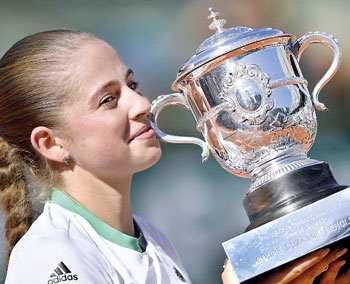Ostapenko’s blitz and Superman Nadal

Jelena Ostapenko
A new name came into prominence at this year’s French-Open . It is Jelena Ostapenko. She is the first Latvian, for that matter, first from the Baltic States to win a Grand-Slam tournament. The French title is hers now. Her performance nearly overshadowed the superman feat of Rafael Nadal’s 10th title win in Paris. From now on, every writer would dig into her career path, to flush out the well kept secret of Ostapenko. She surprised the Tennis world in June.
Two weeks ago, the French Open opened without any favorites for the Women’s title. Some twenty names were considered, none expected it to be Ostapenko, not even in their wildest of imagination. Knowing the capabilities of Romanian Simona Halep, Ostapenko’s opponent in the Paris finals, even in the final moments of the match, many thought, including me, Halep will turn it around. It did not happen, and Ostapenko, former Junior Wimbledon winner, made Halep look like a struggling schoolgirl.
Halep did not only lose that match, but also to be world No.1. It was a big loss for Halep who is playing her best Tennis in a long while.
Ostapenko’s brand of Tennis
The most accepted tactical formula to win in Tennis is to minimise/eliminate errors, engaging opponent from advancing, open the court and hit winners. Today, few players have proved there is another way to win. That is, to be carefree about unforced errors, don’t bother to engage the opponent, just hit a large number of winners from anywhere to everywhere, and hit as hard as you can. In military jargon, this means use ‘firepower’ more than ‘infantry advance’. It is working well with some players, with their modern rackets and super athletic ability.
The first player to go in this direction was former world No.1 Pete Sampras, and then Nadal took it to another level and is still thriving. Up to now, the only woman who could do this extremely well was Serena Williams. Now we have another, Jelena Ostapenko whose forehand at times, was faster than that of Andy Murray’s. To play this brand of Tennis, players must recover quickly from bad situations, be extremely athletic, handle extreme speeds, sense the court from unconventional positions and have nerves of steel. Ostapenko had all of them and, being a good Doubles player, she is very comfortable with her volleys.
Ostapenko was ranked 47 in the world at 19 years, and was not seeded. On her 20th birthday, she won a place in the French Open finals. Not a bad birthday present to have. After winning the title, her ranking has gone up to 12, and she is also ranked 33 in Doubles.
The killer Semifinals
In a two week event, every match is very tough, as the exertions of the previous Round has an impact on the next match. This was the case in both Women’s Singles finalists. Simona Halep’s three set semifinal against Czech Republic’s world No.3 Karolina Pliskova, and Warwinka’s five set semifinal against world No.1 Andy Murray, drained them immensely. It showed in the finals. After tough matches, players need up to four days to recover. All they got was less than 48 hours. Both were slow and sluggish in the finals.
Nadal had an easier passage in the semifinal against Austrian Dominic Thiem, and was much fresher for the final. Although true, the nature of the draw, in the game of Tennis, cannot be cited as a reason for performance. These are eventualities to which players are subjected to when engaged in competition Tennis.
 Nadal’s magic
Nadal’s magic
Just eight weeks ago, Nadal was not playing anywhere close to the form he showed to win his tenth French Open title. He has fully recovered from his injuries. His unconventional stroke-making, shot selection, use of pace and the athletic ability came down like a ton of bricks on every one of his opponents. There can be no argument as to how well he will be remembered for his performance. In the history of the game, very few have come back to be this good. His matches were exciting to watch, imaginative in improvisation and had a magical aura as the superman.
To win the French Open title 10 times, a player has to be in the pro circuit for over 12 years. To Nadal, in these years, every good happened, every bad must have happened, his feelings must have floated in the clouds and for sure, felt like being bogged down in a mud hole. Nadal is worthy of praise for enduring the good and bad times, and living through praise and pain in the same vein. At any given time, on and off the court, he has been an immaculate warrior. When the dust settles, the world will stand up to salute him.
For the Latvian lady Ostapenko, the journey has just begun. In the next decade, she will sacrifice and celebrate, win and endure defeats. She has come through a successful junior career. It was noticeable in the manner she played against seasoned campaigners. If she could last, and I see no reason not to, she too will be praised. Meanwhile, she has given Latvia and the Baltic States something to celebrate.
-George Paldano, Former int. player; Accredited Coach of Germany; National, Davis-Cup, Federation Cup captain/coach– geodano2015@gmail.com –


